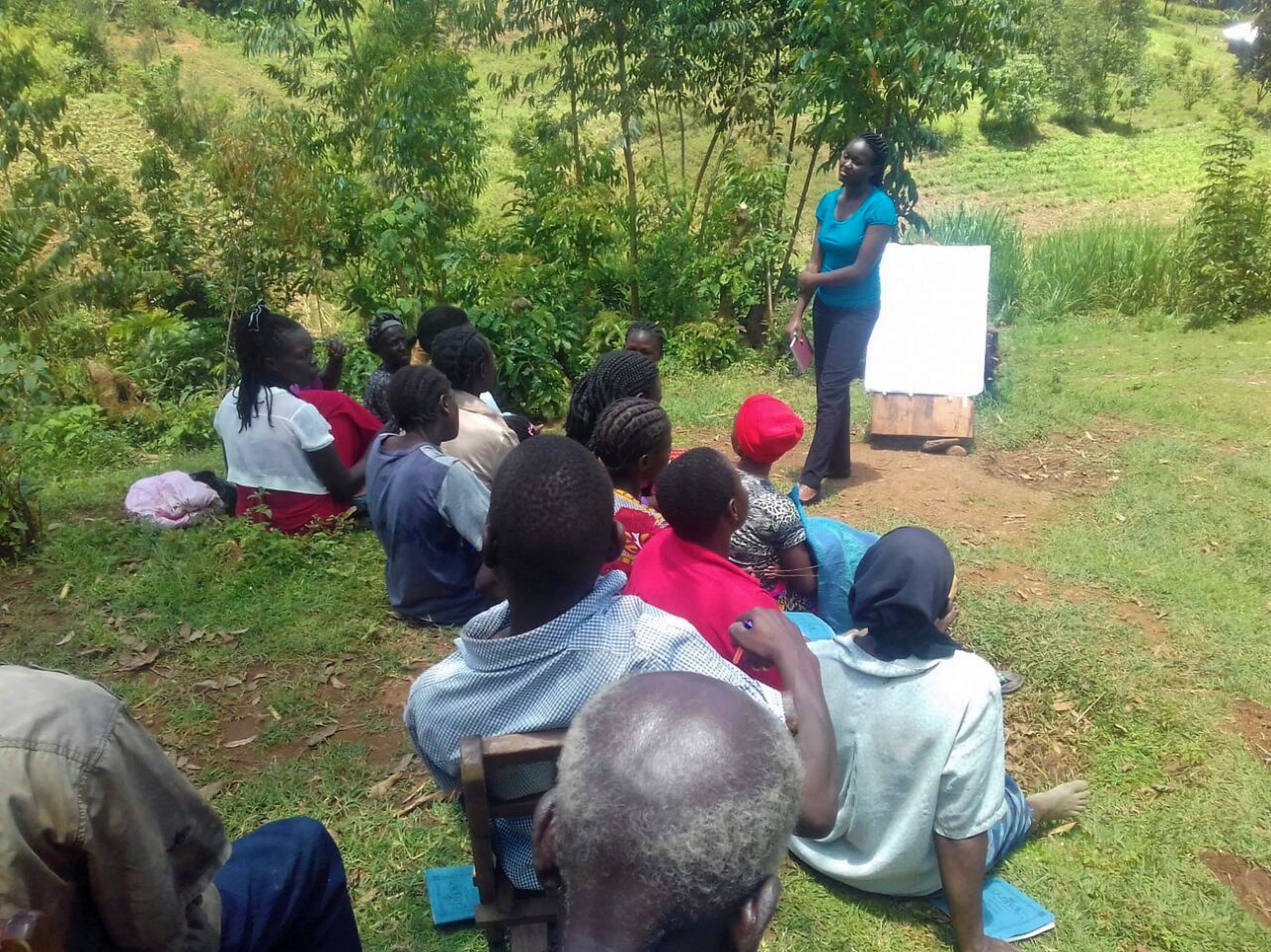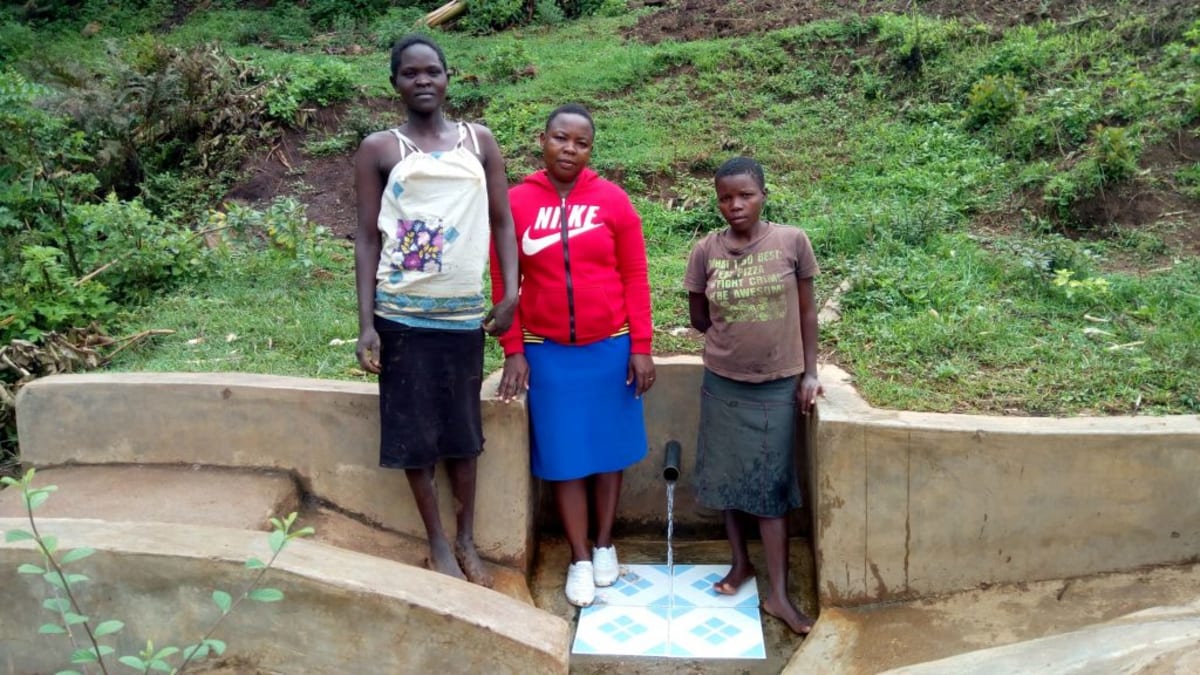Project Updates
July, 2020: COVID-19 Prevention Training Update at Mumuli Community, Shalolwa Spring
Our teams are working on the frontlines of the COVID-19 pandemic. Join us in our fight against the virus while maintaining access to clean, reliable water.

Trainers review prevention reminders chart
We are carrying out awareness and prevention trainings on the virus in every community we serve. Very often, our teams are the first (and only) to bring news and information of the virus to rural communities like Mumuli, Kenya.

A simple piece of cloth becomes a face mask during the tutorial
We trained more than 18 people on the symptoms, transmission routes, and prevention of COVID-19. Due to public gathering concerns, we worked with trusted community leaders to gather a select group of community members who would then relay the information learned to the rest of their family and friends.

Handwashing session
We covered essential hygiene lessons:
- Demonstrations on how to build a simple handwashing station
- Proper handwashing technique
- The importance of using soap and clean water for handwashing
- Cleaning and disinfecting commonly touched surfaces including at the water point.

Handwashing volunteer
We covered COVID-19-specific guidance in line with national and international standards:
- Information on the symptoms and transmission routes of COVID-19
- What social distancing is and how to practice it
- How to cough into an elbow
- Alternative ways to greet people without handshakes, fist bumps, etc.
- How to make and properly wear a facemask.

Handwashing volunteer
During training, we installed a new handwashing station with soap near the community’s water point, along with a sign with reminders of what we covered.
Due to the rampant spread of misinformation about COVID-19, we also dedicated time to a question and answer session to help debunk rumors about the disease and provide extra information where needed.

Homemade mask tutorial
"We have been empowered to go out there and fight Coronavirus," said training participant Mrs. Jane Khayende. "Let us go out and empower all people that live in this village with the knowledge we have been taught. Together, we shall overcome this disease."

A young boy shows the COVID-19 informational pamphlet to his curious little brother
We continue to stay in touch with this community as the pandemic progresses. We want to ensure their water point remains functional and their community stays informed about the virus.

A sample mask made at training
Water access, sanitation, and hygiene are at the crux of disease prevention. You can directly support our work on the frontlines of COVID-19 prevention in all of the communities we serve while maintaining their access to safe, clean, and reliable water.

October, 2018: A Year Later: Mumuli Community, Shololwa Spring
A year ago, your generous donation enabled us to protect Shololwa Spring for Mumuli Community in Kenya. The contributions of incredible monthly donors and others giving directly to The Water Promise allow our local teams to visit project sites throughout the year, strengthening relationships with communities and evaluating the water project over time. These consistent visits allow us to learn vital lessons and hear amazing stories. Read more...

October, 2017: Mumuli Community Project Complete
Shalolwa Spring in Mumuli Community, Kenya is now a protected, clean source of water thanks to your donation. The spring is protected from contamination, five sanitation platforms have been provided for the community, and training has been given in sanitation and hygiene. Imagine the changes that all of these resources are going to bring for these residents! You made it happen! Now, want to do a bit more? Join our team of monthly donors and help us maintain this spring protection and many other projects.
We just updated the project page with the latest pictures, so make sure to check them out! And please enjoy the rest of the report from our partner in Kenya:
Project Result: New Knowledge
Hygiene and sanitation training in Mumuli Community drew quite a crowd; there were 21 people in attendance, all engaged in each activity.

Two of our facilitators covered several topics, including leadership and governance; operation and maintenance of the spring; healthcare; family planning; immunizations; the spread of disease and prevention. We also covered water treatment methods, environmental hygiene, hygiene promotion, and many others. The community should refrain from washing clothes, watering animals, farming with fertilizers, and open defecation in the vicinity.
There was a transect walk, which means we walked around Mumuli with the community members, talking about the environment and keeping an eye out for things that could negatively affect it. We came across a few spots with open defecation, which disgusted community members and motivated them to keep their neighbors accountable and encourage them to build latrines.
We also demonstrated the 10 steps of hand-washing and gave each participants a chance to practice. We taught how to build a tippy-tap (hand-washing station) out of all easily accessible materials. Mr. Jackson thanked the team and confessed to not washing his hands after visiting the latrine. "I will be washing my hands after visiting the toilet, before and after eating, and after farming activities. This is the main thing I have learned," commented Mr. Jackson.

A few days after training, we returned to take final pictures of the finished spring protection. During our visit, we noticed that many more homes now have dish racks, clotheslines, and compost pits.
Project Result: Sanitation Platforms
All five sanitation platforms have been installed and are ready for use. These five families are happy about this milestone and are optimistic that there will be much less open defecation. People without proper latrines would often use the privacy of bushes, but now have a private place of their own. It is expected that proper use of latrine facilities provided by the sanitation platforms will go a long way in reducing environmental pollution here. We are continuing to encourage families to finish building walls and roofs over their new latrine floors.

Project Result: Spring Protection
Community members provided all locally available construction materials, e.g bricks, wheelbarrows of clean sand, wheelbarrows of ballast, fencing poles and hard core (crushed rock and gravel). Accommodation and food for the artisan were provided, and a few people even volunteered their time and strength to help the artisan with manual labor.

The spring area was excavated to create space for setting the foundation of polythene, wire mesh and concrete. After the base had been set, both wing walls and the head wall were set in place using brickwork. The discharge pipe was fixed low in place through the head wall to direct the water from the reservoir to the drawing area.
As the wing walls and head wall were curing, the stairs were set and the tiles were fixed directly below the discharge pipe. This reduces the erosive force of the falling water and beautifies the spring. The process of plastering the head wall and wing walls on both sides reinforces the brickwork and prevents water from the reservoir from seeping through the walls and allows pressure to build in the collection box to push water up through the discharge pipe. Lastly, the base of the spring was plastered and the collection box was cleaned. The source area was filled up with clean hardcore and covered with a polythene membrane to eliminate any potential sources of contamination. Finally, grass was planted and cutoff drains dug to direct surface water away from the spring box.

Beginning to work on the steps down to the spring.
This process has transformed Shalolwa Spring into a clean water source. People gathered to celebrate this transformation and fetch their first buckets of clean water. As health improves with the presence of clean and safe water, time and money will be unlocked for economic progress.

September, 2017: Mumuli Community Project Underway
Mumuli Community will soon have a clean, safe source of water thanks to your donation. Community members have been drinking contaminated water from Shalolwa Spring, and often suffer physical illnesses after doing so. Our partner conducted a survey of the area and deemed it necessary to protect the spring, build new sanitation platforms (safe, easy-to-clean concrete floors for latrines), and conduct sanitation and hygiene training. Thanks to your generosity, waterborne disease will no longer be a challenge for the families drinking the spring’s water. We look forward to sharing more details with you as they come! But for now, please take some time to check out the report containing community information, pictures, and maps.


 Protected Spring
Protected Spring
 Rehabilitation Project
Rehabilitation Project





































